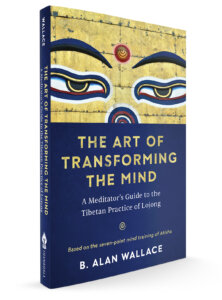Lojong, or mind training, is a core practice in all the lineages of the Tibetan tradition. They can perhaps best be characterized as a method for transforming our mind by turning away from self-centeredness and cultivating instead the mental habits that generate bodhicitta, the awakened mind that puts the benefit of others above all else. The teachings on it are more diverse than many people realize, so we thought we would lay out a map of its origins and development for our readers, with some recommendations along the way for books through which the practice can be explored.
New and Recent Releases on Lojong
Paperback | eBook
$18.95 - Paperback
The Heroic Heart: Awakening Unbound Compassion
Just as the archetypal hero possesses the heart to face trials and tribulations for the sake of helping others, the bodhisattva has a remarkable resolve to free others from suffering so that all may achieve true happiness and awakening. Through each challenge, the Buddhist hero of compassion develops rich inner qualities that empower them to be of true benefit to others.
In The Heroic Heart, Jetsunma Tenzin Palmo, an esteemed spiritual teacher with a lifetime of experience, illuminates the heart of Mahayana Buddhism—bodhichitta—describing it as “the selfless expression of boundless compassion.” Jetsunma uses as a touchstone the famous Tibetan Buddhist text The Thirty-Seven Verses on the Practice of a Bodhisattva. Here, she reveals how to become such a compassionate hero, the bodhisattva in training, and helps us to face the uncertain tides of the world, however joyful or dangerous, with a deep wish to find meaning and uncover the ultimate heart of wisdom and compassion.

Paperback | eBook
$18.95 - Paperback
The Power of Mind: A Tibetan Monk’s Guide to Finding Freedom in Every Challenge
by Khentrul Lodrö T'hayé Rinpoche
A modern guidebook based on ancient Buddhist techniques for transforming emotional pain, anxiety, and stress into complete mental well-being that benefits us and the people around us.
We’ve all heard platitudes about cultivating love and compassion, but how can we really develop these qualities in ourselves and—crucially—share them in our world? The Power of Mind provides a proven path.
Khentrul Rinpoche teaches that regardless of what’s unfolding in our lives, our route to freedom lies in our minds—and how we work with them. A thousand years ago, the Indian saint Atisha endured great hardship to bring the Buddha’s teachings to Tibet, where they flourished. This book introduces a primary text that emerged—the Seven Key Points of Mind Training.
Khentrul Rinpoche learned these practices from teachers who faced innumerable hardships during the Cultural Revolution. Rinpoche was moved by the ability of these teachers who, like alchemists, were able to follow these techniques to transform their suffering into something good.
The Power of Mind shares instructions that we can work through, one by one—from recognizing the preciousness and impermanence of our lives to avoiding drama and self-centeredness—along with meditations and practices. This wisdom is accessible to anyone seeking inner transformation—whether Buddhist or not. As Khentrul Rinpoche states, “Peace and happiness can be attained, but not by searching for something in the outside world. They start within us then extend out to the entire globe.”
Paperback | eBook
$24.95 - Paperback
The Art of Transforming the Mind: A Meditator’s Guide to the Tibetan Practice of Lojong
Includes three new translations of Atisha’s source material including Pith Instructions on a Single Mindfulness and Pith Instructions on the Middle Way.
The purpose of lojong, a traditional Mahayana Buddhist practice of training the mind, is about transforming one’s attitude and expanding one’s sense of self to encompass the greater whole. In this modern presentation of lojong practice and Atisha’s Seven-Point Mind Training, author, translator, and Buddhist practitioner B. Alan Wallace gives readers a framework from which they may cultivate the qualities of loving-kindness, compassion, and insight while diminishing harmful habits and ways of thinking. “All of us have attitudes,” Wallace explains, and “attitudes need adjusting.” The practice of lojong is therefore presented as a method to shift our attitude away from our problems, anxieties, hopes, and fears toward an expansive sense of joy and well-being that springs from the very essence of Mahayana—bodhichitta.
The Origins of Lojong
The origin of lojong as a codified system is generally attributed to Atisha, the eleventh-century Bengali master who came to Tibet and founded the Kadampa tradition and whose influence on all the Tibetan lineages was profound. Some teachers identify the actual origin of lojong with Atisha's teachers-Maitriyogi, Dharmarakshita, and Serlingpa-while others attribute the teachings to Atisha's main student, Dromtonpa (1005-64).
In fact, Thubten Chodron's Good Karma: How to Create the Causes of Happiness and Avoid the Causes of Suffering, is based on a text called The Wheel of Sharp Weapons that is generally attributed to Dharmarakshita.
Whatever the case, it is reasonable to think of Atisha as the anchor of these teachings.
A full, fascinating biography along with a great array of translations of his work was published as Atisa Dipamkara: Illuminator of the Awakened Mind. The author and translator, James Apple, is one of the foremost scholars of Atisha and his works.
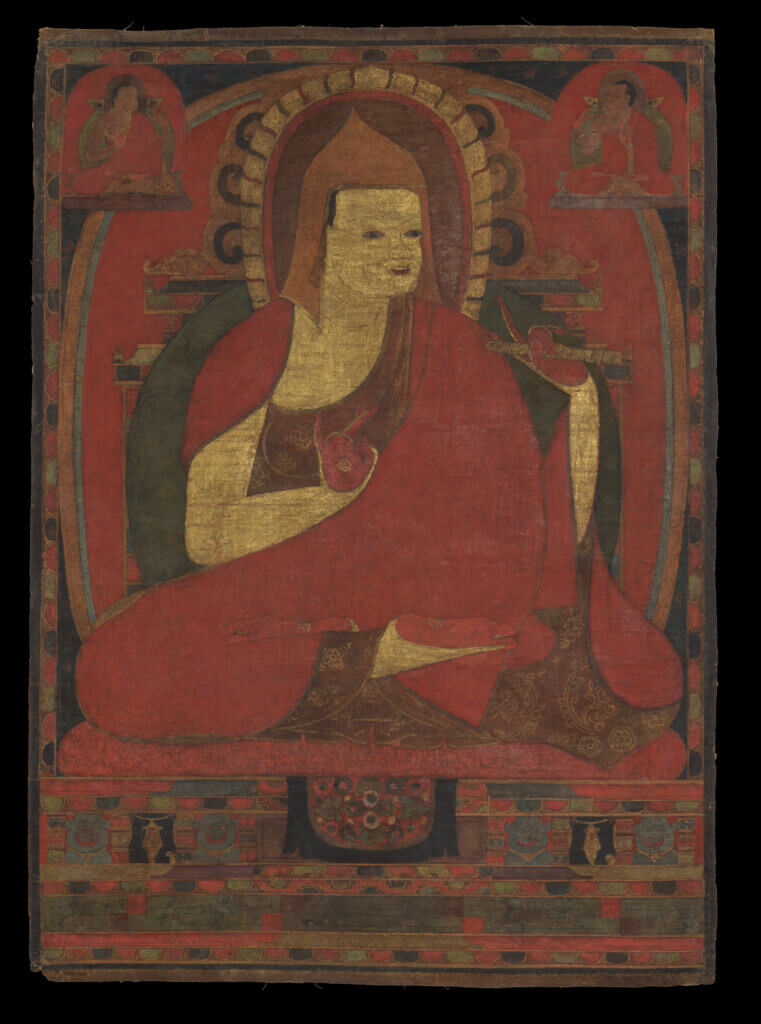
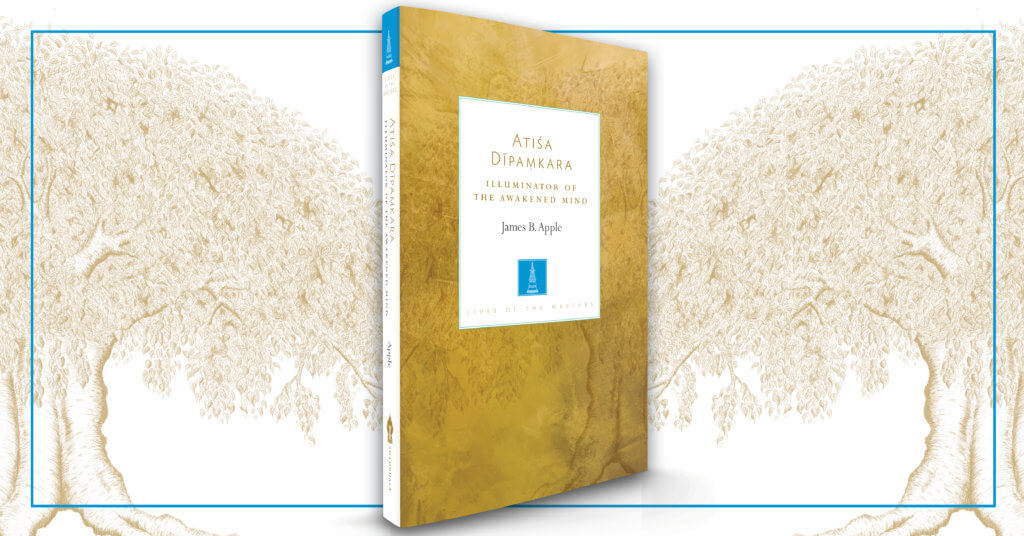
Paperback | Ebook
$24.95 - Paperback
In 2016 in Boulder, His Holiness the Dalai Lama gave a talk on the lojong text The Eight Verses (see below) and explained how Atisha and his teachers took this from Shantideva, in both his Way of the Bodhisattva classic(for example in the eighth chapter where he presents the lojong practice of exchanging self and others, known as tonglen in Tibetan) as well as in his Compendium of Training (a new translation of which is available from Oxford 2016). Shantideva in turn looked back to Nagarjuna, particularly in his Precious Garlandand his Bodhicittavivarna, or Exposition on Enlightened Mind, which is discussed at length in In Praise of Dharmadhatu. And Nagarjuna himself used the sutras as his sources, in particular the Avatamsaka, known in English as The Flower Ornament Scripture.
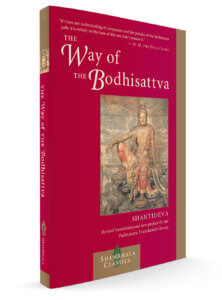
By Shantideva
Translated by Padmakara Translation Group
Treasured by Buddhists of all traditions, The Way of the Bodhisattva (Bodhicharyavatara) is a guide to cultivating the mind of enlightenment, and to generating the qualities of love, compassion, generosity, and patience. This text has been studied, practiced, and expounded upon in an unbroken tradition for centuries, first in India, and later in Tibet. Presented in the form of a personal meditation in verse, it outlines the path of the Bodhisattvas—those who renounce the peace of individual enlightenment and vow to work for the liberation of all beings and to attain buddhahood for their sake.
This version, translated from the Tibetan, is a revision by the translators of the 1997 edition. Included are a foreword by His Holiness the Dalai Lama, a new translator's preface, a thorough introduction, a note on the translation, and three appendices of commentary by the Nyingma master Kunzang Pelden.

Paperback
$24.95 - Hardcover
Nagarjuna's Precious Garland: Buddhist Advice for Living and Liberation
By Nagarjuna
Translated by Jeffrey Hopkins
Treasured by Buddhists of all traditions, The Way of the Bodhisattva (Bodhicharyavatara) is a guide to cultivating the mind of enlightenment, and to generating the qualities of love, compassion, generosity, and patience. This text has been studied, practiced, and expounded upon in an unbroken tradition for centuries, first in India, and later in Tibet. Presented in the form of a personal meditation in verse, it outlines the path of the Bodhisattvas—those who renounce the peace of individual enlightenment and vow to work for the liberation of all beings and to attain buddhahood for their sake.
This version, translated from the Tibetan, is a revision by the translators of the 1997 edition. Included are a foreword by His Holiness the Dalai Lama, a new translator's preface, a thorough introduction, a note on the translation, and three appendices of commentary by the Nyingma master Kunzang Pelden.
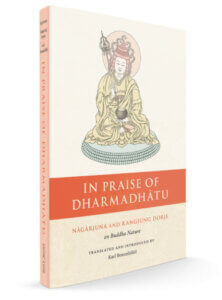
Paperback | eBook
$29.95 - Paperback
In Praise of Dharmadhatu: Nagarjuna and Rangjung Dorje on Buddha Nature
By Nagarjuna and Rangjung Dorje
Translated by Karl Brunnhölzl
Nāgārjuna's works sit at the heart of Mahāyāna Buddhist thought and practice, but he was renowned in Asia not only for his Madhyamaka work, but also his poetic collection of praises, most famously In Praise of Dharmadhatu. This book explores the scope, contents, and significance of Nāgārjuna’s scriptural legacy in India and Tibet, focusing primarily on this seminal work. The translation of Nāgārjuna’s hymn to buddha nature—here called dharmadhatu—shows how buddha nature is temporarily obscured in the experience of ordinary sentient beings, gradually uncovered through the path of bodhisattvas, and finally revealed in full bloom as buddhahood. Included is a translation of the text’s earliest and most extensive commentary by the Third Karmapa, Rangjung Dorje (1284–1339), supplemented by relevant excerpts from all other available commentaries.
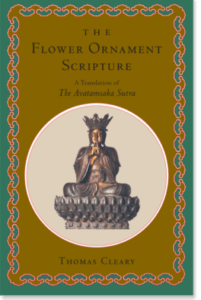
Hardcover | eBook
$125.00 - Hardcover
The Flower Ornament Scripture: A Translation of the Avatamsaka Sutra
Translated by Thomas Cleary
Known in Chinese as Hua-yen and in Japanese as Kegon-kyo, the Avatamsaka Sutra, or Flower Ornament Scripture, is held in the highest regard and studied by Buddhists of all traditions. Through its structure and symbolism, as well as through its concisely stated principles, it conveys a vast range of Buddhist teachings.
This one-volume edition contains Thomas Cleary's definitive translation of all thirty-nine books of the sutra, along with an introduction, a glossary, and Cleary's translation of Li Tongxuan's seventh-century guide to the final book, the Gandavyuha, "Entry into the Realm of Reality."
The Heirs of Atisha
From Atisha and the Kadampa masters who followed him, we have received a rich array of core lojong texts that form the basis for the commentaries and teachings we have today. Originally the lojong teachings-often just collections of short sayings-were considered secret and were not widely disseminated, but this changed with the works of two Kadampa masters in particular.
The first was Langri Thangpa (1054-1123), whose teacher, Geshe Potawa (1027-1105), was one of the three main disciples of Dromtonpa and whose succinct Eight Verses on Training the Mind continues to be widely taught-recently by His Holiness the Dalai Lama to over ten thousand people in New York's Central Park. His Holiness has taught this text on numerous occasions and has published three works on it: a section in An Introduction to Buddhism, the audio recording Eight Verses for Training the Mind (an mp3 download of which is expected soon), and a section in Kindness, Clarity, and Insight. Another commentary is from the late Geshe Sonam Rinchen, also called Eight Verses for Training the Mind.
An Excerpt on Atisha's Lamp for the Path to Enlightenment from An Introduction to Buddhism by His Holiness the Dalai Lama
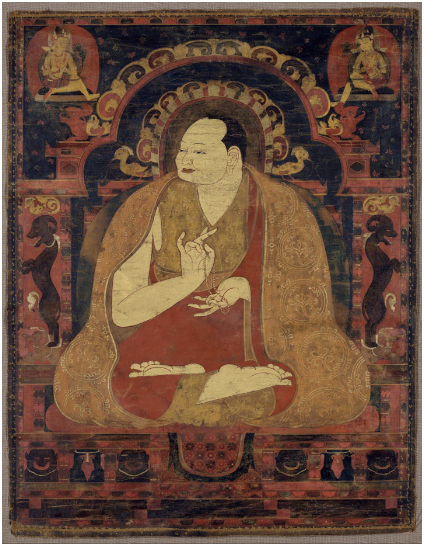
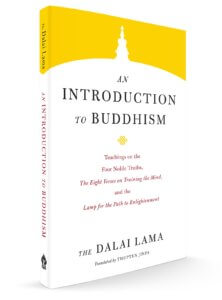
Paperback | eBook
$16.95 - Paperback
By H.H. the Fourteenth Dalai Lama
There is no one more suited to introduce beginners—and remind seasoned practitioners—of the fundamentals of Tibetan Buddhism than His Holiness the Dalai Lama. Speaking to an audience of Western students, the Dalai Lama shows us how to apply basic Buddhist principles to our day-to-day lives. Starting with the very foundation of Buddhism, the Four Noble Truths, he provides the framework for understanding the Buddha’s first teachings on suffering, happiness, and peace. He follows with commentary on two of Buddhism’s most profound texts: The Eight Verses on Training the Mind and Atisha’s Lamp for the Path to Enlightenment, often referring to the former as one of his main sources of inspiration for the practice of compassion. With clear, accessible language and the familiar sense of humor that infuses nearly all of his work, the Dalai Lama invites us all to develop innermost awareness, a proper understanding of the nature of reality, and heartfelt compassion for all beings.
This book was previously published under the title Lighting the Way.
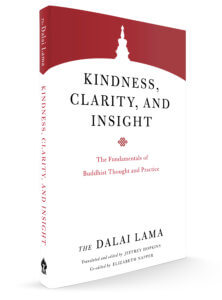
Paperback | eBook
$16.95 - Paperback
Kindness, Clarity, and Insight: The Fundamentals of Buddhist Thought and Practice
By H.H. the Fourteenth Dalai Lama
This beloved classic brings together in one volume all the major themes of the Dalai Lama’s teachings. Drawn from the lectures he gave during his first three visits to North America, the book covers the core subject matter of Tibetan Buddhism, as presented for the first time to an English-speaking audience. The chapters are arranged developmentally from simple to complex topics, which include the luminous nature of the mind, the four noble truths, karma, the common goals of the world’s religions, meditation, deities, and selflessness. Central to all these teachings is the necessity of compassion, which the Dalai Lama declares is “the essence of religion” and “the most precious thing there is.”
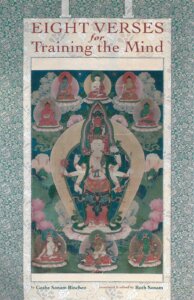
Paperback | eBook
$18.95 - Paperback
Eight Verses for Training the Mind
By Geshe Sonam Rinchen
Edited and Translated by Ruth Sonam
How do we free ourselves from the demon of self-concern? These instructions are found in Eight Verses for Training the Mind, one of the most important texts from a genre of Tibetan spiritual writings known as lojong (literally "mind training"). The root text was written by the eleventh-century meditator Langritangpa. His Holiness the Dalai Lama refers to this work as one of the main sources of his own inspiration and includes it in his daily meditations.
The Seven Points of Mind Training
One of the earliest commentaries on Langri Thangpa's Eight Verses was by Geshe Chekawa Yeshe Dorje (1102-76), who devoted twelve years to putting the teachings into practice. After seeing the effect of the teachings on a village of lepers who were cured by them-and experiencing the teachings' remarkable effect on the mind of his unsavory brother-Chekawa decided to share them widely. He became the first to break the teachings down into the now-familiar seven points. Though this model became common, when people refer to The Seven Points of Mind Training, it is almost always Chekawa's text to which they refer (even if they call it Atisha's Seven Points of Mind Training). His text consists of fifty-nine aphorisms or slogans that encapsulate the essence of lojong.

There are many commentaries on Chekawa's text. One of the more famous is by Ngulchu Thogme Zangpo, the early fourteenth-century Kadampa master who also authored the renowned Thirty-Seven Practices of a Bodhisattva. In Enlightened Courage, Dilgo Khyentse Rinpoche teaches on Thogme Zangpo's commentary on Chekawa's text.
The great nineteenth-century master Jamgon Kongtrul Lodro Taye also included a commentary on Chekawa's text in his Treasury of Special Instructions. It is available in English as The Great Path of Awakening.
And there are many contemporary masters who teach on this text because it is so easy to put into practice and can have such a profound effect:
In The Practice of Lojong, Traleg Rinpoche calls the practices "a profound antidote to the victim mentality that has become so prevalent in our times. "
Ringu Tulku received his training in lojong from Dilgo Khyentse Rinpoche and wrote Mind Training, which is a succinct presentation of the slogans.
B. Alan Wallace wrote two books on the text: Seven-Point Mind Training and his newest release, The Art of Transforming the Mind (see above).
Chogyam Trungpa based his Training the Mind on both Chekawa's text and Jamgon Kongtrul's commentary. He said that this practice of training the mind-which follows taming the mind-is an antidote to the main obstacle for Mahayana practitioners: not having enough sympathy for others and for oneself.
Dzigar Kongtrul Rinpoche's The Intelligent Heart: A Guide to the Compassionate Life is another excellent book on The Seven Points of Mind Training with an emphasis on tonglen.
The most recent - and superb - addition is by the teaching duo Anyen Rinpoche and Allison Choying Zangmo, Stop Biting the Tail You Are Chasing: Using Buddhist Mind Training to Free Yourself from Painful Emotional Patterns. Not only is this an excellent reminder for those with experience, it can serve as an excellent introduction to Buddhist teachings in general. A great "starter" book but that in no way indicates its depth which is vast.

Paperback | eBook
$18.95 - Paperback
Enlightened Courage: An Explanation of the Seven-Point Mind Training
By Dilgo Khyentse Rinpoche
Translated by Padmakara Translation Group
Highly respected by thousands of students throughout the world, Dilgo Khyentse Rinpoche was one of the foremost poets, scholars, philosophers, and meditation masters of our time. Here he speaks frankly, drawing on his own life experience. Condensing the compassionate path to Buddhahood into practical instructions that use the circumstances of everyday life, Rinpoche presents the Seven-Point Mind Training—the very core of the entire Tibetan Buddhist practice.
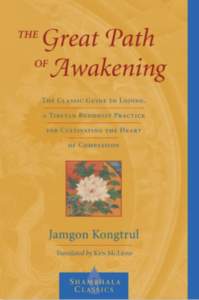
Paperback
$16.95 - Paperback
By Jamgon Kongtrul Lodro Taye
Translated by Ken McLeod
Here is a practical Buddhist guidebook that offers techniques for developing a truly compassionate heart in the midst of everyday life. For centuries, Tibetans have used fifty-nine pithy slogans—such as "A joyous state of mind is a constant support" and "Don't talk about others' shortcomings"—as a means to awaken kindness, gentleness, and compassion. While Tibetan Buddhists have long valued these slogans, recently they have become popular in the West due to such books as Start Where You Are by Pema Chödrön and Training the Mind by Chögyam Trungpa.
This edition of The Great Path of Awakening contains an accessible, newly revised translation of the slogans from the famous text The Seven Points of Mind Training. It also includes illuminating commentary from Jamgon Kongtrul that provides further instruction on how to meet every situation with intelligence and an open heart.
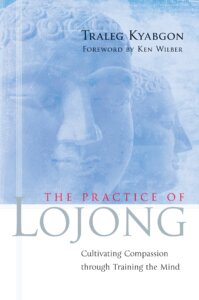
Paperback | eBook
$22.95 - Paperback
The Practice of Lojong: Cultivating Compassion through Training the Mind
For many centuries Indian and Tibetan Buddhists have employed this collection of pithy, penetrating Dharma slogans to develop compassion, equanimity, lovingkindness, and joy for others. Known as the lojong—or mind-training—teachings, these slogans have been the subject of deep study, contemplation, and commentary by many great masters.
In this volume, Traleg Kyabgon offers a fresh translation of the slogans as well as in-depth new commentary of each. After living among and teaching Westerners for over twenty years, his approach is uniquely insightful into the ways that the slogans could be misunderstood or misinterpreted within our culture. Here, he presents a refreshing and clarifying view, which seeks to correct points of confusion.
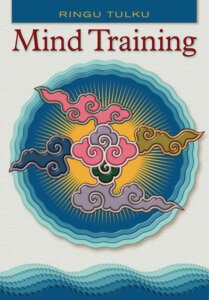
Paperback | eBook
$18.95 - Paperback
By Ringu Tulku
This small accessible book contains the essence of the Seven-Point Mind Training, expressed in the intimate colloquial style that distinguishes Ringu Tulku's teachings. The Seven-Point Mind Training, a lojong practice, assumes no prior special training or preparation. It does not require practitioners to enter seclusion or change the way they live their lives. It asks that they examine their relationships with all those around them and make a strong determination to become enlightened for others' sake rather than for their own. It gives instructions for tonglen breathing practice that ties the concepts of lojong to the physical act of breathing. Mind Training focuses simply on giving up, self-cherishing, and transforming self-centered thinking into compassion, egoistic feelings into altruism, desire into acceptance, and resentment into joy.

Paperback | eBook
$19.95 - Paperback
Seven-Point Mind Training: A Tibetan Method for Cultivating Mind and Heart
By B. Alan Wallace
Edited by Zara Houshmand
In this society, with its hurly-burly pace demanding of our time, it is ever so easy to let life slip by. Looking back after ten, twenty, thirty, years—we wonder what we have really accomplished. The process of simply existing is not necessarily meaningful. And yet there is an unlimited potential for meaning and value in this human existence. The Seven-Point Mind Training is one eminently practical way of tapping into that meaning. At the heart of the Seven-Point Mind Training lies the transformation of the circumstances that life brings us, however hard as the raw material from which we create our own spiritual path. The central theme of the Seven-Point Mind Training is to make the liberating passage from the constricting solitude of self-centeredness to the warm kinship with others which occurs with the cultivation of cherishing others. This Mind Training is especially well-suited for an active life. It helps us to reexamine our relationships—to family, friends, enemies, and strangers—and gradually transform our responses to whatever life throws our way.
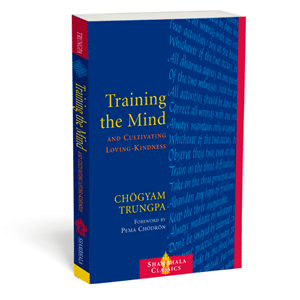
Paperback | eBook
$16.95 - Paperback
Training the Mind and Cultivating Loving-Kindness
Warning: Using this book could be hazardous to your ego! The slogans it contains are designed to awaken the heart and cultivate love and kindness toward others. They are revolutionary in that practicing them fosters abandonment of personal territory in relating to others and in understanding the world as it is.
The fifty-nine provocative slogans presented here—each with a commentary by the Tibetan meditation master Chögyam Trungpa—have been used by Tibetan Buddhists for eight centuries to help meditation students remember and focus on important principles and practices of mind training. They emphasize meeting the ordinary situations of life with intelligence and compassion under all circumstances. Slogans include, "Don't be swayed by external circumstances," "Be grateful to everyone," and "Always maintain only a joyful mind."

Paperback | eBook
$21.95 - Paperback
The Intelligent Heart: A Guide to the Compassionate Life
By Dzigar Kongtrul
By Joseph Waxman
Compassion arises naturally when one comes to perceive the lack of solid distinction between self and other. The Buddhist practice known as tonglen—in which one consciously exchanges self for other—is a skillful method for getting to that truthful perception. In this, his commentary on the renowned Tibetan lojong (mind training) text the Seven Points of Mind Training, Dzigar Kongtrul reveals tonglen to be the true heart and essence of all mind-training practices. He shows how to train the mind in a way that infuses every moment of life with uncontrived kindness toward all.

Paperback | eBook
$16.95 - Paperback
By Anyen Rinpoche
By Allison Choying Zangmo
Are emotions our friends or our enemies? Is it possible to free ourselves from emotional conflict? The Buddhist practice of lojong is a way of letting go of attachment to both “positive” and “negative” emotions and leads to profound insight and compassion, unbounded by our habitual reactions. This book provides a set of tools that you can apply in daily life to gradually relieve your own suffering and extend that relief to everyone you encounter.
Lojong Beyond the Kadampa School
While the core Kadampa lojong texts are taught throughout the Tibetan schools, some schools gave them their own unique expression. In the Sakya tradition, a core lojong teaching is Drakpa Gyaltsen's Parting from the Four Attachments. The Nyingma and Kagyu traditions have lojong built into the Ngondro practices in the form of meditations and reflections on the "Four Thoughts " and on generating bodhicitta. Khandro Rinpoche's This Precious Life provides a good example of this. Perhaps the most famous Ngondro commentary is Patrul Rinpoche's Words of My Perfect Teacher, which constantly refers back to Atisha, Dromtonba, Chekawa, Drakpa Gyaltsen, and others. Khenpo Ngwang Pelzang's Guide to the Words of My Perfect Teacherdoes the same.
However, there is a particular and very unique Nyingma presentation of lojong and that is Steps to the Great Perfection: The Mind-Training Tradition of the Dzogchen Masters. In this unique and masterful work, Jigme Lingpa presents mind training from the core teachings familiar in all the above works and then introduces the Dzogchen-specific instructions.
The evolution and influence of lojong is not limited to Tibetan Buddhism. Zen teacher Norman Fischer has introduced it to his Zen and interfaith audiences in Training in Compassion, seeing that Zen practitioners can benefit from its explicit teachings in compassion-and that the lojong practitioners can also benefit from the Zen perspective.

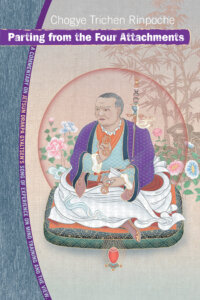
Paperback | eBook
$22.95 - Paperback
The teaching on Parting from the Four Attachments is universally regarded as one of the jewels of Tibetan Buddhism. Rinpoche leads the reader through a detailed and lucid exploration of the nature of mind, pointing out inevitable pitfalls in spiritual practice and showing how they can be avoided.
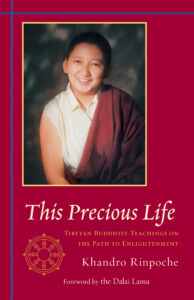
Paperback | eBook
$22.95 - Paperback
This Precious Life: Tibetan Buddhist Teachings on the Path to Enlightenment
By Jetsun Khandro Rinpoche
Using the traditional Tibetan Buddhist framework of the Four Reminders—the preciousness of human birth, the truth of impermanence, the reality of suffering, and the inescapability of karma—Khandro Rinpoche explains why and how we could all better use this short life to pursue a spiritual path and make the world a better place. The book includes contemplative exercises that encourage us to appreciate the tremendous potential of the human body and mind.

Paperback | eBook
$34.95 - Paperback
A Guide to The Words of My Perfect Teacher
By Khenpo Ngawang Pelzang
Translated by Padmakara Translation Group
This guide provides readers with essential background information for studying and practicing with Patrul Rinpoche's Words of My Perfect Teacher—the text that has, for more than a century, served as the reliable sourcebook to the spiritual practices common to all the major schools of Tibetan Buddhism. By offering chapter-by-chapter commentary on this renowned work, Khenpo Pelzang provides a fresh perspective on the role of the teacher; the stages of the path; the view of the Three Jewels; Madhyamika, the basis of transcendent wisdom; and much more.

Paperback | eBook
$24.95 - Paperback
Steps to the Great Perfection: The Mind-Training Tradition of the Dzogchen Masters
By Jigme Lingpa
Translated by Cortland Dahl
A compilation of teachings on the seven contemplations, an ancient system of mind-training (lojong) teachings that has been preserved as part of a rare set of instructions on Dzogchen, or the Great Perfection, this book is unique because although the lojong teachings of the Kadam tradition are well known, this is the first time the mind-training teachings from the Dzogchen tradition have been presented in an English translation, and most Western scholars and practitioners are unaware that such mind-training techniques even exist in Dzogchen. The contemplations themselves are vividly described, and some unfold as dramatic stories in which the meditator imagines himself or herself as the main character. Thus, they are quite accessible for beginning practitioners.
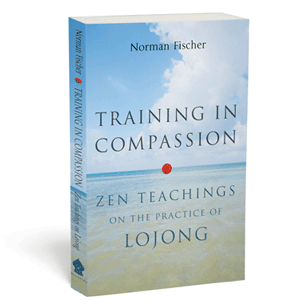
Paperback | eBook
$18.95 - Paperback
Training in Compassion: Zen Teachings on the Practice of Lojong
Lojong is the Tibetan Buddhist practice that involves working with short phrases (called "slogans") as a way of generating bodhichitta, the heart and mind of enlightened compassion. Though the practice is more than a millennium old, it has become popular in the West only in the last twenty years or so—and it has become very popular indeed, because it's a practice that one can fit very well into an ordinary life, and because it works.Through the influence of Pema Chödrön, who was one of the first American Buddhist teachers to teach it extensively, the practice has moved out of its Buddhist context to affect the lives of non-Buddhists too.
It's in this spirit that Norman Fischer offers his commentary on the lojong slogans. He applies Zen wisdom to them, showing how well they fit in that related tradition, but he also sets the slogans in the context of resonant practices throughout the spiritual traditions. He shows lojong to be a wonderful method for everyone, including those who aren't otherwise interested in Buddhism, who don't have the time or inclination to meditate, or who'd just like to morph into the kind of person who's focused rather than scattered, generous rather than stingy, and kind rather than thoughtless.

Paperback | eBook
$19.95 - Paperback
Good Karma: How to Create the Causes of Happiness and Avoid the Causes of Suffering
Why do things happen the way they do in our lives? How do we create the causes for a happy life? The Buddhist practice of mind training gives us the answer to these questions: it involves overcoming our self-centered attitude and replacing it with an attitude that cherishes others. This, in turn, leads us to act in ways that naturally lead away from suffering and toward happiness—in short, to create good karma. Thubten Chodron offers a commentary on one of the great Tibetan Buddhist poems, The Wheel of Sharp Weapons, which shows, clearly and practically, how to eliminate the causes of anxiety, fear, and depression and to create the causes of joyful liberation for oneself and all others.
And, of course, Pema Chodron has brought lojong teachings to a very broad audience with her book Start Where You Are, probably the most widely read book on lojong in English.
And if you love Start Where You Are, you will also love her latest, Pema Chodron's Compassion Cards: Teachings for Awakening the Heart in Everyday Life and The Compassion Book which is a great way to really ingrain the lojong slogans by interacting with them ,testing yourself. This deck includes Pema's introduction to the practice, fifty-nine cards representing the full set of lojong teachings for daily inspiration and contemplation, a practical commentary from Pema on the reverse of each card, a card stand for easy display, and an audio download of Pema's teachings on the related practice of tonglen.
We hope you enjoy learning about the lojong tradition from some of these wonderful teachers and that they help us all to open our hearts and minds, and become more generous, flexible, and tame.


Paperback | Hardcover | eBook
$19.95 - Paperback
Start Where You Are: A Guide to Compassionate Living
By Pema Chodron
We all want to be fearless, joyful, and fully alive. And we all know that it’s not so easy. We’re bombarded every day with false promises of ways to make our lives better—buy this, go here, eat this, don’t do that; the list goes on and on. But Pema Chödrön shows that, until we get to the heart of who we are and really make friends with ourselves, everything we do will always be superficial. Here she offers down-to-earth guidance on how we can go beyond the fleeting attempts to “fix” our pain and, instead, to take our lives as they are as the only path to achieve what we all yearn for most deeply—to embrace rather than deny the difficulties of our lives. These teachings, framed around fifty-nine traditional Tibetan Buddhist maxims, point us directly to our own hearts and minds, such as “Always meditate on whatever provokes resentment,” “Be grateful to everyone,” and “Don’t expect applause.” By working with these slogans as everyday meditations, Start Where You Are shows how we can all develop the courage to work with our own inner pain and discover true joy, holistic well-being, and unshakeable confidence.

Mixed Media
$16.95 - MixedMedia
Pema Chödrön's Compassion Cards: Teachings for Awakening the Heart in Everyday Life
By Pema Chodron
Let compassion and fearlessness guide you and you’ll live wisely and effectively in good times and bad. Here Pema Chödrön offers a powerful method to awaken these qualities using a practice called lojong, which has been a primary focus of her teachings and personal practice for many years. In this boxed set, she provides all the tools needed to practice it in your own life. It includes:
-
- an introduction to the practice
-
- fifty-nine cards representing the full set of lojong teachings for daily inspiration and contemplation
-
- practical commentary from Pema on the reverse of each card
-
- a card stand for easy display
-
- and an audio download of Pema’s teachings on the related practice of tonglen

Paperback | eBook
$17.95 - Paperback
The Compassion Book: Teachings for Awakening the Heart
By Pema Chodron
Let compassion and fearlessness guide you and you’ll live wisely and effectively in good times and bad. But that’s easier said than done. Here Pema Chödrön introduces a powerful, transformative method to nurture these qualities using a practice called lojong, which has been a primary focus of her teachings and personal practice for many years. This book presents fifty-nine pithy slogans from the lojong teachings for daily contemplation and includes Pema’s clear, succinct guidance on how to understand them—and how they can enrich our lives. It also features a forty-five minute downloadable audio program entitled “Opening the Heart.”




